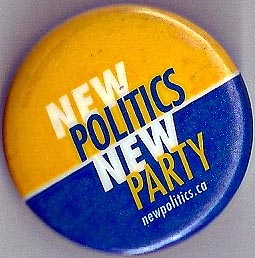I wasn’t sure what to think when I was approached to reflect on the 10th anniversary of the New Politics Initiative.
My immediate reaction was, I’m too busy, and would people be interested anyway? But then I thought, well, maybe there are some good experiences to share here that will help people as they grapple with the politics of today — a decade later.
So here goes….
My whole political life (starting at age 19 as an organizer in Vancouver’s Downtown Eastside and first running for political office in 1976), I’ve been caught up in the dynamics and sometimes conflict of left politics, electoral politics, and social movements. The disconnect between these elements fascinates me and I’ve always wanted to figure it out. I’ve always believed there is a better understanding to be arrived at, for us all to move forward as progressives.
Naïve? I don’t think so — only complicated and something that needs thought and initiative.
The NPI was a truly bold and exciting initiative because it dared to openly raise questions and issues and put them on the political table for all to see. Not without political risk.
What was important about the NPI?
– It created space for real political debate.
– It didn’t seek to “control” debate, but rather to formulate an openness about the NDP and its relationship with political allies and how political work could be engaged in.
– I agree with Judy Rebick’s point, in her piece in this series, that it wasn’t just a matter of moving politics left, it was about changing the WAY we do politics overall.
– It was a unique intersection of party, social movement, labour, new activists and old, who overcame biases and saw a bigger need as reflected in the statement of principles.
– NPI challenged the status quo, on the basis that we could do better, and create a more progressive and open political party.
It was terrifically exciting and I experienced some of the best political discourse in my life during that time. Some within the NDP were very threatened and possibly misinterpreted what it was about. It was seen as a threat to the party, as evidenced by the debate at the Winnipeg Convention in 2001.
When Jack Layton got elected as Leader of the NDP in 2003 there was a general feeling amongst us NPI-ers that we’d gone as far as we could and that Jack embodied many of the goals of a new kind of politics. So we folded up our tent and said, we’re too busy — we did what we wanted to do.
Only years later did I realize that it was a mistake to fold up the NPI totally. We still needed some kind of way to foster the idea of new politics and specifically how the NDP related to broader political engagement. For awhile we did OK and the echo of the NPI drew the NDP to a much closer connection to mass campaigns on anti-globalization and the WTO and FTAA. But it never changed much structurally on either side. The social movements overall were as much mistrustful of what the NDP was really up to as the NDP was overly cautious of negative feedback.
Had it remained, the NPI would have changed, evolved, for sure, but the essential and underlying point is that you can’t rely on good individual relations one-on-one to bring about big political change — you have to have some sort of vehicle, or space, or structure to sustain and grow new progressive politics. Nor can you rely on a political party structure alone, that is more focused on electoral success to facilitate that change.
These are some of the same issues that Occupy is faced with. It’s not about one big tent where everyone agrees (so unlikely) and everything is sunk to the lowest common denominator; rather it’s about meaningful and serious relationships that can produce effective and progressive change, especially in today’s world of failed capitalism, where people are yearning for change.
Oh, is this really a shameful way of yearning for NPI to return as some old glory?
I hope not, as times do change and new players emerge, as do new challenges.
Still, with an NDP leadership race underway — and the new buzz word being “new politics” that many candidates are adopting — it is worth looking at closely, so it doesn’t just become wordsmith game.
I’ll end with two questions that I ask myself and maybe others will think about, too:
1) What does “new politics” mean today in a specific way for the NDP and the allies it works with?
2) What is our response in the face of the global meltdown, to show there is a 99 per cent way forward to change the course we are on.
Thanks! Libby
Libby Davies is MP for Vancouver East, Deputy Leader of the NDP, and was a co-founder of the NPI.
Dear rabble.ca reader… Can you support rabble.ca by matching your mainstream media costs? Will you donate a month’s charges for newspaper subsription, cable, satellite, mobile or Internet costs to our independent media site?




